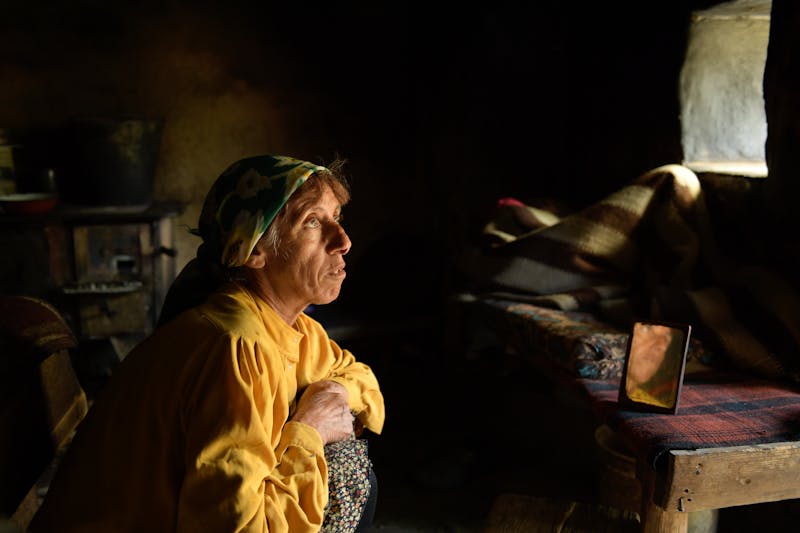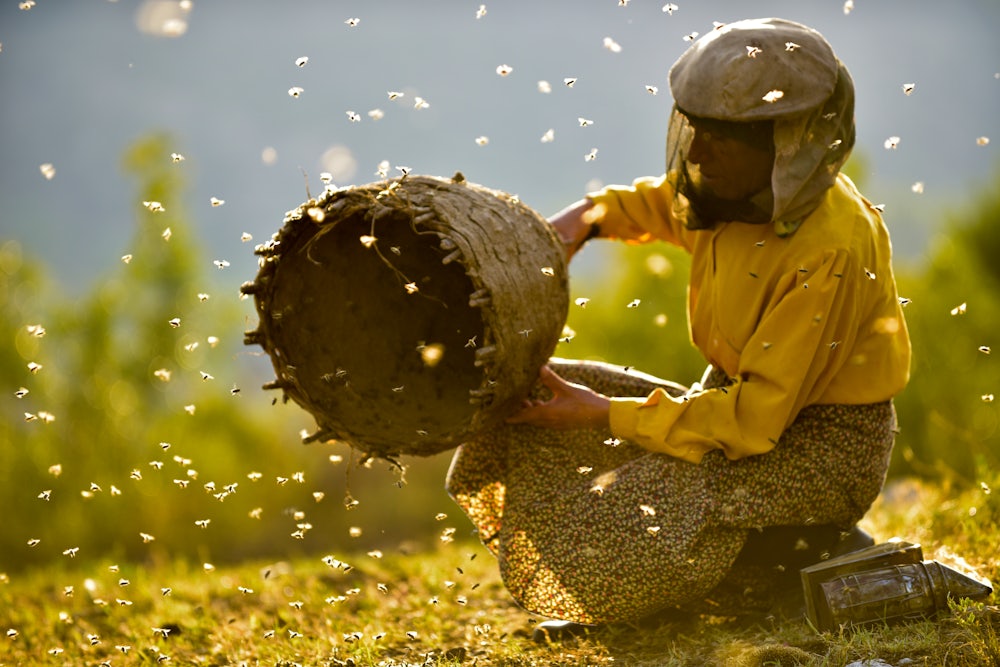The scene is Mediterranean. Outdoors, the sun is bright and universal, leaving only a few shadows dotted around the rocky, rural, mountainous landscape. Indoors, it is dark, the ground of the tiny dwelling made of unfinished earth. These are the two major spheres of the life of Hatidze Muratova, Macedonian beekeeper of Turkish ethnicity: Outside, she sings to the bees that she tends with an expert, traditional hand. Inside, she spoons their honey into the mouth of her 85 year-old mother, a living testament to the power of the elixir her daughter cultivates.
Muratova is the hero of Honeyland, a new documentary that buzzed through the festival circuit, accumulating a rapturous response (most awarded at Sundance, for example) rare for its medium. The accolades are deserved: Directors Tamara Kotevska and Ljubomir Stefanov have made a movie more like an Italian Renaissance painting than a documentary, the sheer beauty of its cinematography and charm of its subject elevating the film into a sophisticated allegory of modern agriculture’s sins.
Hatidze makes her honey all by herself, isolated in the mountains. Early on, we see her travel to the capital Skopje, where she banters goodnaturedly with men at the market, selling them her honey for ten euros a jar. She’s wickedly funny but sweet: When a market vendor hears how she devotes her life to caring for her mother Nazife, he gives her a fan decorated with a peacock’s tail. Gently placing it into Nazife’s hands, the old woman’s ruined face (one eye has been destroyed by a wound or infection) lights up with childlike joy.
This is the general effect Hatidze has, both on the viewer and on the people around her. The woman’s strength and resilience are extraordinary. She was born in 1964, she tells us, and yet here she is wheeling an enormous rock up a mountain, all her muscles alive to the task.

Then, new neighbors arrive. Honeyland has no voiceover, so we get to know them through Hatidze’s eyes and the subtle machinations of her expressions. Hussein and Ljutvie are a couple with a huge brood of children, who simply show up one day on the mountain to start a farm. The family has a trailer full of rough-and-tumble little boys and a bunch of chickens. As we watch Hussein labor to establish his livelihood, it’s immediately clear that he has a very different relationship to animals and landscape. He fights against his animals, beating his cattle into submission.
Hatidze is delighted by the arrival of the little children, who she pets and charms and cuddles while their parents work. One infant girl is especially taken with her, so Hatidze takes her home to visit her mother and gives her a kitten. Together, Hatidze and the kids fiddle with an old radio, play on the swings. She teaches the babies letters by drawing them in the dirt with a stick.
This friendly arrangement transforms, however, when Hatidze tries to teach Hussein how to keep bees. As he coaxes her traditional knowledge out of her, we can tell that he is calculating to screw her over—it’s there in his face. He sets up some hives, but treats the bees with disrespect: He has no songs for them, and he sells too much of their honey, ruining the health of the colony. What began as a collaboration turns into a nightmare, as Hussein’s bees begin to attack Hatidze’s, the natural order of things thrown irrevocably out of whack. He refuses to acknowledge his mistake, and her bees are all killed.
This week, the academic journal Plos One published a study conclusively showing that the systemic use of pesticides in American agriculture has led to the phenomenon known as Colony Collapse Disorder, or CDD. The disaster began in the U.S. in 2006, when bees began to mysteriously disappear from commercial hives. They left no corpses behind, or evidence of clear causation: The bees simply vanished. By 2013, ten million bee colonies had died across the nation.
Via sleeper-hit documentaries like 2009’s Vanishing of the Bees, which followed apiarists as they struggled to prove that something had gone terribly wrong, public awareness of the plight of the bees rose. No single factor killed our bees. Instead, a mounting accumulation of agricultural bad practices (monoculture crops led to bad bee diets, and a huge rise in pesticide use has ruined their health long term) tilted the axis of the environment toward destruction.
In classical cultures, the bee symbolized feminine deities, like the Minoan-Mycenean godhead Potnia, who was sometimes called “The Pure Mother Bee.” Her acolytes were named Melissa, which means “bee.” Priestesses to Demeter and Artemis were known as “bees.” Virgil wrote philosophically about bees in his Georgics, which many have read as a coded meditation on the civil war that had just concluded, his celebration of bees’ loyalty and altruism reflecting Rome’s new hope. Bees in part attracted such laurels because of their mysteriousness: It was difficult for ancient cultures to quite understand how bees did what they did, and myths abounded, like Virgil’s idea that they hatched spontaneously from sacrificed bullocks.
Bees are the kind of animal we call “charismatic”: As with polar bears and pandas, their suffering easily comes to stand as a symbol for the general destruction of the natural world by modern capitalism and industrialization. This modest story about one rural beekeeper thus feels like a holistic depiction of the end of the world. CDD is not actually Hatidze’s problem, but the murder of her bees by organized farming forms an unmistakable symbolic parallel.
In Vanishing of the Bees, Michael Pollan describes agricultural monoculture as a paradox: “It is destroying the conditions on which it depends. It has internal contradictions that will lead to breakdown.” But his words don’t just apply to the vast tracts of soy and corn that cover the American landscape. Monoculture—the cultivation of a single crop as opposed to multiple crops, as in traditional farming—is an agricultural term, but we could also apply it more broadly to humans’ relationship with the natural world. When there is only one way of doing things—the way prescribed by big business, which seeks only to maximize crop yield—then human beings have made a mistake.
Hatidze speaks Turkish and describes herself as “a Turk,” making her part of an ethnic minority in Macedonia. Honeyland treats her practice with profound reverence, and cinematographer Fejmi Daut films the shadows in the Muratova dwelling just the way that Caravaggio painted saints. The film vibrates with texture, color, and ethnic specificity. I wish I could convey how funny the characters are, even as they suffer: When Hussein orders his son to go “collect the honey,” for example, the little punk responds, “You’ll collect my ass!”
As an intervention in the conversation around climate change and natural disaster, Honeyland performs the unique feat of uniting agriculture with human culture, to prove that it is really all just culture. This country’s great error has been to separate these domains from each other, investing big business with the godlike power that really belongs in the hands of experts who respect their animals—like Hatidze. If it takes emotional intelligence to care for bees, then the same will be true of the planet.
